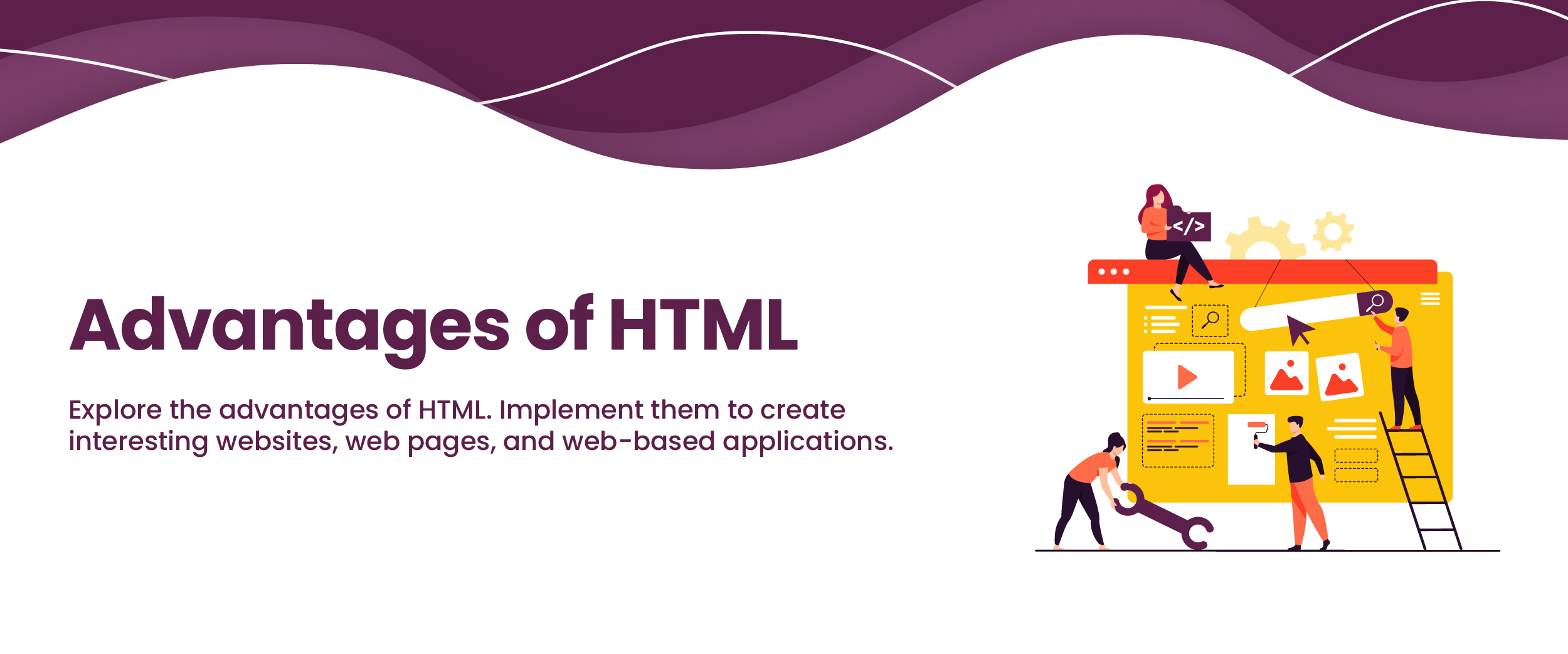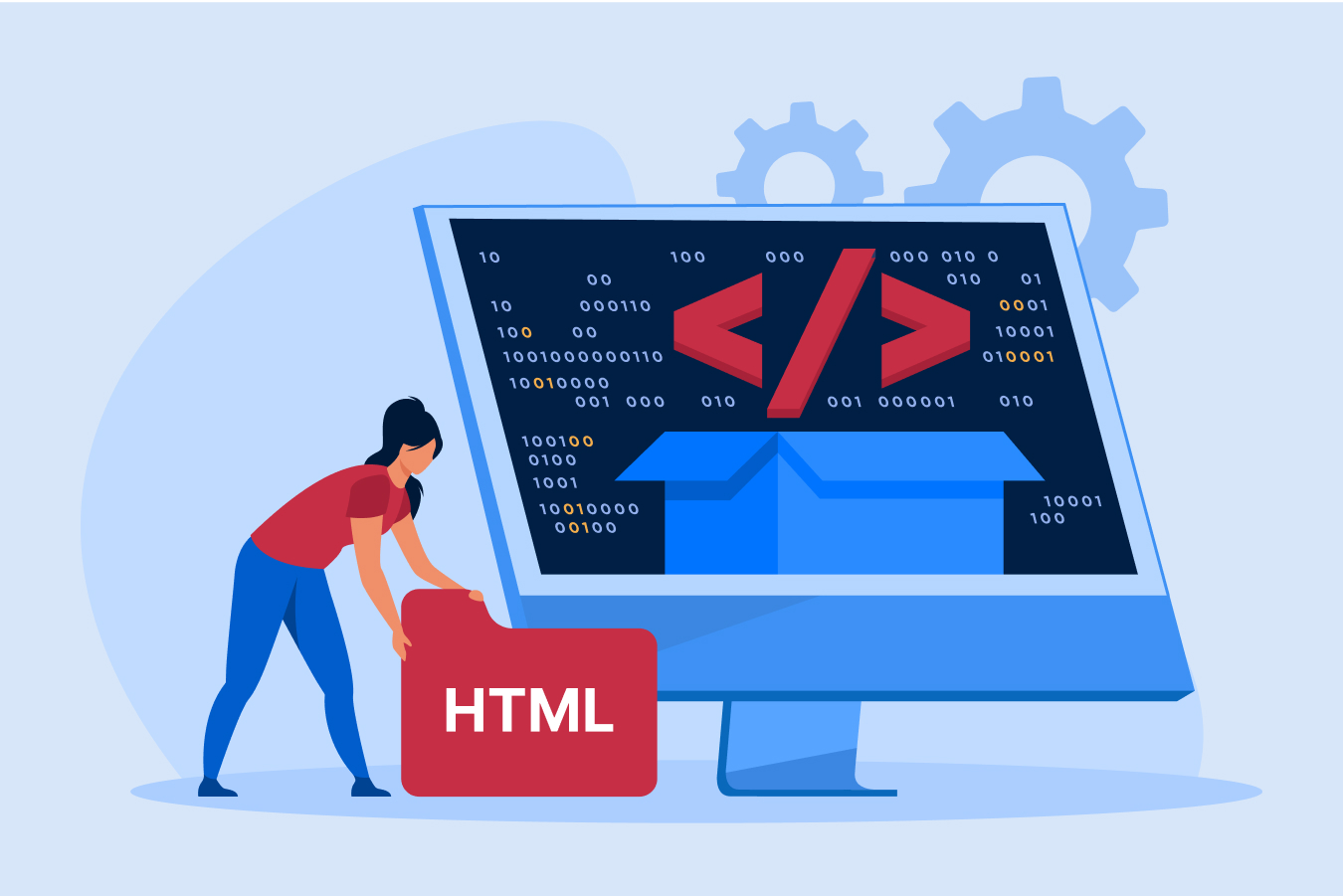Top 8 Advantages of HTML: A Powerful Tool for Web Development
Over the years, HTML has undergone multiple transformations, with the latest and most widely embraced version being HTML5. This version brings a host of advantages that make it a powerful tool for modern web development. It also offers new features and elements that facilitate everything from native video and audio support to canvas graphics rendering and enhanced accessibility.
In this blog, we will not only explore the advantages of HTML but also look into its various aspects that contribute to its indispensability in the world of web design and development.
What Is HTML?
HTML has established itself for making and designing web pages. The process is achieved using a combination of tags and elements that enable users to determine document structure along lines of format, content, and layout.
Multimedia elements, such as text, images, or interactive components, are becoming commonplace content for web pages today. HTML’s in-built capacity to integrate these different factors seamlessly makes it an indispensable language for displaying information on the World Wide Web.
Get a confirmed ₹35,000 total stipend with our Full stack developer course with placement guarantee.
Advantages of HTML
The advantages of HTML stem from its foundational role in web development. It offers many benefits to both users and developers. Here are some of the advantages HTML brings to the world of web design.
1. Simplicity and Ease of Use
A primary advantage of using HTML is that it is simple and practical. It does exactly what you need it to do and gives you high-quality results. Markup tags help structure the design of your website just the way you want and work smoothly on different devices and platforms.
You don’t have to worry about writing complicated code all the time. Plus, HTML works well across many devices, so no matter where you are, your website will still look and function the way it’s supposed to.
2. Compatibility
Developers prefer HTML for its broad browser and platform compatibility, making it a universally supported language for web design. One of the advantages of HTML lies in its ability to ensure consistent rendering on various devices and screen sizes, providing a seamless user experience across different browsing platforms.
This allows developers to create inclusive websites that cater to diverse visitor preferences.
3. Search Engine Optimization (SEO) Friendliness
HTML is important for SEO because it helps structure web pages effectively, which search engines rely on for assessing relevance. Heading tags, meta tags, and semantic markup are key tools that developers use to create well-structured pages, leading to better visibility in search results.
Using these HTML features properly can significantly boost organic traffic and overall website success.
4. Flexibility and Extensibility
HTML lets developers create awesome websites with interactive content. The secret lies in teaming up with Cascading Style Sheets (CSS) and Javascript.
CSS helps with how things look, like images and layout choices. Meanwhile, Javascript adds the fun part, making things move and even doing math in real-time. When these three buddies work together, web developers can make super-strong apps that users love using.
5. Accessibility
- It’s crucial for website developers to make sure their sites are accessible to everyone. By using HTML’s built-in features and attributes that match accessibility standards, it’s much easier to create websites that are user-friendly for people with different abilities.
For instance, things like alt text for images, meaningful headings, and ARIA attributes can make a big difference for folks who use screen readers or other assistive devices. The great thing is that HTML’s structure inherently supports these accessibility practices, ensuring that everyone can navigate and use these sites, regardless of their abilities.
6. Efficiency and Performance
The optimized structure is among HTML’s significant advantages, as it allows for a lightweight language that boosts web page efficiency and performance. The smaller files reduce bandwidth usage while enhancing loading time speeds, making mobile browsing an easier experience.
To provide uninterrupted browsing experiences to users who prefer quick-loading sites on the go, website developers rely on HTML’s efficiency.
7. Community and Resources
A remarkable fact about HTML is its expansive network of developers, designers, and enthusiasts that continuously add value through different initiatives.
The active involvement of this vibrant community ensures that learners have access to numerous resources, such as courses, manuals, or how-to guides, in their quest for proficiency in using HTML.
8. Continuous Evolution
HTML and HTML5 are the two different versions. HTML has evolved significantly, with HTML5 being the latest version. It offers multimedia support, offline storage, drag-and-drop functionality, and more.
These features empower developers to create engaging web apps without relying on external tools. As HTML continues to advance, its capabilities will only get stronger in future revisions.
You can also consider taking an online web development course to make dynamic and visually appealing websites.
Disadvantages of HTML
The following are the disadvantages of HTML.
1. Static Language
HTML is not a programming language, so it cannot be used to create dynamic content. This means that it cannot be used to create content that will change based on user input or other variables.
2. Security Issue
HTML is not secure, so it can be vulnerable to malicious attacks. HTML does not provide any authentication mechanisms, therefore, malicious actors can easily gain access to websites or applications.
3. Complex Coding and Editing
To create a simple webpage, it requires a long code. Hence, the editing of a webpage becomes complex. Each page of a website is edited separately and cannot be centralized.
4. Limited Design Elements
HTML offers limited design options due to its static nature; it can only create basic elements, such as text, images, links, tables, and lists. It cannot create complex design elements, such as animations, 3D graphics, and interactive elements.
5. Unsuitable for Complex Applications or Websites
HTML is not designed to handle complex applications or websites. It is not a programming language and cannot be used to create complex logic or processes. It also does not have the capability for server-side scripting to create dynamic web pages or databases.
How is HTML5 Better Than HTML?
HTML5 is the latest version of HTML, the standard markup language for creating websites and web applications. It offers improved features and functionality compared to HTML. Take a look at the following table to learn how HTML5 is better than HTML.
| Parameters | HTML | HTML5 |
| Version | It is the first and most basic HTML, developed in 1993. | It is the latest version of the hypertext markup language, released in 2014. |
| Multimedia Support | It has the ability to add images, text, and audio to a web page. | It has the ability to embed video and audio without the need for external plugins and supports graphics and animation. |
| Compatibility with Web Browsers | HTML is not compatible with all browsers. Different browsers support HTML to different degrees. | HTML5 is compatible with almost all popular browsers, like Google Chrome, Apple Safari, Microsoft Edge, and others. |
| Web Storage | HTML does not provide web storage. | Web storage APIs, such as localStorage and sessionStorage were introduced in HTML5. |
| Design Elements | HTML has a wide range of design elements, ranging from basic structures, such as headings, paragraphs, and lists to advanced form elements, semantic elements, and enhanced styling and scripting. | HTML 5 introduced features such as multimedia elements, 3D graphics, and improved forms and input elements to create engaging and interactive websites. |
Conclusion
Web developers rely on various tools to assist them in crafting exemplary digital experiences online. However, one tool has remained constant, i.e., HTML. HTML stands out because of its flexibility, even when optimizing for search engines and creating accessibility features. Undoubtedly, the advantages of HTML provide limitless possibilities, from website creation to web development.
Also, check out HTML interview questions to start your career as an HTML expert and land your favorite job.






